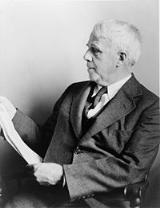
. He is highly regarded for his realistic depictions of rural
life and his command of American colloquial speech. His work frequently employed settings from rural life in New England
in the early twentieth century, using them to examine complex social and philosophical themes. A popular and often-quoted poet, Frost was honored frequently during his lifetime, receiving four Pulitzer Prizes for Poetry
.
Robert Frost was born in San Francisco, California
, to journalist William Prescott Frost, Jr., and Isabelle Moodie.
I do not see why I should e'er turn back, Or those should not set forth upon my track To overtake me, who should miss me here And long to know if still I held them dear. They would not find me changed from him they knew — Only more sure of all I thought was true.![]()
Ah, when to the heart of manWas it ever less than a treasonTo go with the drift of things,To yield with a grace to reason,And bow and accept the endOf a love or a season?![]()
I’m going out to clean the pasture spring;I’ll only stop to rake the leaves away(And wait to watch the water clear, I may):I sha’n’t be gone long. — You come too.![]()
And nothing to look backward to with pride,And nothing to look forward to with hope.![]()
Home is the place where, when you have to go there,They have to take you in.![]()
The nearest friends can goWith anyone to death, comes so far shortThey might as well not try to go at all.No, from the time when one is sick to death,One is alone, and he dies more alone.Friends make pretence of following to the grave,But before one is in it, their minds are turnedAnd making the best of their way back to lifeAnd living people, and things they understand.![]()
Most of the change we think we see in lifeIs due to truths being in and out of favor. ![]()
The best way out is always through.![]()
Pressed into service means pressed out of shape.![]()
Forgive me my nonsense as I also forgive the nonsense of those who think they talk sense.![]()

